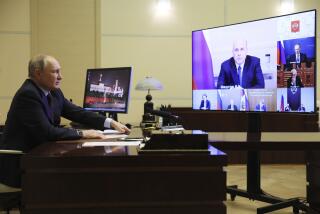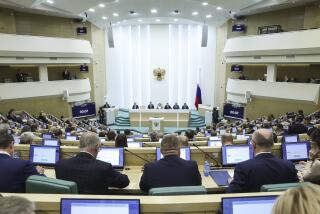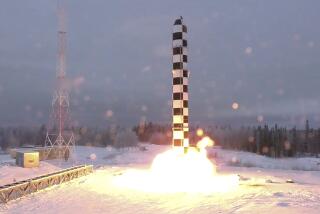Clinton Adds 15 Months to Ban on Nuclear Tests
- Share via
WASHINGTON — President Clinton announced Saturday that he will extend for at least 15 months the current moratorium on underground nuclear testing.
In extending the ban at least through September, 1994, the President called upon other nuclear powers to join in resisting the urge to undertake a nuclear test. “If, however, this moratorium is broken by another nation, I will direct the Department of Energy to prepare to conduct additional tests, while seeking approval to do so from Congress,” he warned in his weekly radio address.
Clinton’s announcement was heavy with symbolism, coming as it did on the eve of a 10-day trip that will culminate at the economic summit in Japan, the only country ever to have been under nuclear attack. In 1945, the United States began the nuclear age by dropping atomic bombs on Hiroshima and Nagasaki.
In Moscow, Russian President Boris N. Yeltsin assured a high-ranking U.S. envoy during a Kremlin meeting that his country will continue to observe its own test freeze as long as the United States and other nuclear powers honor theirs.
Senate Majority Leader George J. Mitchell (D-Me.) called Clinton’s decision “an important step toward making our world safer.”
“The President’s decision indicates that he understands that the post-Cold War world is a very different place,” Mitchell said in a written statement. “There is no need to conduct tests of nuclear weapons merely to demonstrate our strength to other nuclear powers.”
Last year, Congress imposed a nine-month testing moratorium as part of legislation directing that a worldwide ban on nuclear testing be negotiated by 1996. After the moratorium’s expiration last Thursday, the legislation would have allowed 15 nuclear tests before the 1996 deadline.
Military officials argued publicly that the resumption of testing is crucial to ensuring the safety and reliability of the weapons. However, pressure had been mounting in Congress to delay further tests on the theory that doing so would enhance the chances of negotiating the comprehensive ban.
If U.S. testing were to continue, it was feared, other nations would resume their own tests, making it more difficult to persuade Third World nations to cooperate in halting the spread of nuclear weapons.
In his radio address, the President conceded that both arguments have merit. “Additional nuclear tests could help us prepare for a test ban and provide for some additional improvements in safety and reliability,” he said. “However, the price we would pay in conducting those tests now, by undercutting our own non-proliferation goals and ensuring that other nations would resume testing, outweighs these benefits.”
During his presidential campaign, Clinton had vowed to achieve a comprehensive test ban. He renewed that commitment at his April summit with Yeltsin in Vancouver, Canada.
His decision whether to extend the moratorium past September, 1994, will hinge on the status of the comprehensive test ban negotiations and on whether other nuclear powers are showing similar restraint, the Administration said.
Four countries in addition to the United States are members of the so-called “nuclear club.”
France has not conducted any tests since declaring a nine-month moratorium in April, 1992. However, its new conservative government is considering resuming them.
Britain, which conducts its tests at the U.S. underground site in Nevada, had hoped that Clinton would lift the moratorium, because it prevents British testing as well.
China, which is considered the nation most likely to resume testing, has not exploded a nuclear weapon since last Sept. 25, two days after the most recent U.S. test.
Yeltsin has prolonged a ban on nuclear explosions that dates to October, 1991, when it was proclaimed by Soviet President Mikhail S. Gorbachev. Calls for a global end to nuclear tests were a staple of Gorbachev’s “new thinking” in foreign policy.
Strobe Talbott, American ambassador at large to the former republics of the Soviet Union, gave Yeltsin a message from Clinton that, according to the Itar-Tass news agency, stated Clinton’s intention to extend the U.S. test ban through September, 1994.
According to Itar-Tass, Yeltsin for his part assured Talbott of his “principled stand that Russia would observe the announced moratorium until any other moratorium-observing nuclear state resumes tests.”
The Russian moratorium--like the U.S. test freeze--formally expired last Thursday. But Yeltsin told reporters then that Russia would not be the first to test another nuclear weapon. He also revealed that the possibility of an international ban on testing will be raised when he and the leaders of the Group of Seven industrial nations meet this week in Tokyo.
Tumulty reported from Washington and Dahlburg from Moscow.
More to Read
Sign up for Essential California
The most important California stories and recommendations in your inbox every morning.
You may occasionally receive promotional content from the Los Angeles Times.










